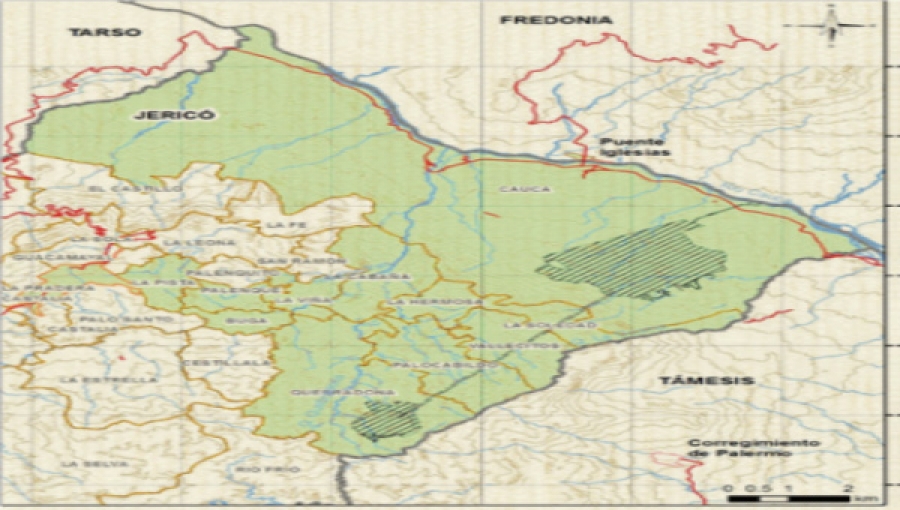AngloGold Ashanti Updates ‘Quebradona’ Mine Environmental Impact Assessment; Aims to Recycle Tailings for Roads, Buildings

Global mining giant AngloGold Ashanti Colombia announced December 16 that it has launched initial recycling of mine tailings near Jericó, southwest Antioquia, into a cement-like product suitable for buildings, prefab homes, roads, ceramics, paints, outdoor furniture and soil amendments.
The announcement comes on the heels of new demands from Colombia’s environmental licensing agency (ANLA) and Antioquia’s Mining Secretariat for more information on how AngloGold Ashanti aims to avoid environmental impacts from its proposed “Quebradona” copper-gold mine near Jericó.
To date, AngloGold has already fabricated outdoor furniture, chairs, drinking fountains and flower pots – all made from tailings — for three schools in Jericó.
“In order to help close the cycle of waste produced by mining activity and thus advance in the generation of a true circular economy, ‘Minera de Cobre Quebradona’ will implement different alternatives to give a new use to dry tailings,” according to AngloGold.
“We are testing the dry tailings in different applications,” explained Andrés Felipe López Bermúdez, Manager of Innovation at the Quebradona project. “The inert tailings — which are almost dry — are very fine sands, which have a thousand possibilities in terms of construction. Soon we will do the first test of tailings for paving tertiary roads. We have a possibility of paving 1,800 kilometers of tertiary roads in the southwest [Antioquia], where the tailings of Quebradona can serve this purpose and enhance the competitiveness of farmers so that they can move their products with less travel times,” López added.
On a related front, AngloGold announced December 15 that it is generating additional data for ANLA regarding “monitoring of surface water quality, hydrobiological and isotopic parameters in the tributaries of the upper, middle and lower parts of the La Palma and La Guamo streams that are in the [rural districts of] La Hermosa, Palocabildo, Vallecitos and La Soledad,” near the Quebradona mining site.
As for the Secretariat of Mines of Antioquia, “as part of the mining licensing process, an alignment and understanding meeting was held between the technicians of the Secretariat and Minera de Cobre Quebradona staff to clarify and respond to a large part of the [additional environmental data] requirements,” according to the Secretariat.
The additional data will include updates and revisions to maps and geological studies in specific mining areas, according to the Secretariat.
Mayor of Jericó Supports Project
While various environmental advocacy groups and some nearby residents have raised fears and objections to the proposed underground mine, Carlos Augusto Giraldo, former two-time Mayor of Jericó, argued in a December 7 column in Jericho newspaper Al Poniente that AngloGold has proven to be an environmentally and socially responsible miner.
“In the framework of the ANLA’s recent visit to Jericó, some opponents of the Quebradona project affirmed on social networks and in the media that the vast majority of Jericoanos had come out to protest against it,” Giraldo stated.
“The reality is that of the almost 100 people who took to the streets, only a few, less than 10, were from the municipality. The rest came from other places in buses and collective taxis.
“This is a clear example that what happens in Jericó is different from what some people think and declare from Medellín, from Bogotá, from far away Miami or from those who sign applications on the internet from other municipalities, or even from outside the country.
“The mining company’s workers are not at some desk processing a license. They are usually here in Jericó, they get involved with the people, they listen to the questions and they respond with transparency.
“It is true that, in recent years, thanks to the work carried out to promote tourism and other agricultural activities, the municipality has developed new sources of resources and employment.
“But if we Jericoanos have something clear, it is that there is still a long way to go in terms of education, health and well-being. For this reason, a large part understands that all [mining] activities can be carried out with responsibility and oversight by the state and citizens.
“Some data about what Jericó is experiencing: according to the DNP [Colombia’s national development planning department], the net coverage of education here is 77.7%, compared to 84.5% in Antioquia. In secondary education, aimed at 10th and 11th grade youth, the net coverage is 52.2%.
“Likewise, a study carried out by the ECSIM Foundation indicated that one out of every five inter-municipal trips made from the [southwestern Antioquia] province of Cartama to Medellín is for health reasons due to the lack of the required health-care services here.
“Although Jericó does better than some of its neighbors in DANE’s [Colombia’s economic statistics agency] multidimensional poverty indicators, there are areas of the municipality that register percentages of up to 100%.
“In this context, Minera de Cobre Quebradona has understood that its role as a catalyst for the economy must positively impact other social aspects, for which it has worked using institutional channels to support local entities.
“What happens in Jericó, as referenced by the National Consulting Center in a study published in May, is that the majority of people here support the project, not for one reason, but for the multiple reasons mentioned above.
“My invitation to the opponents is to listen to the people, understand their fears and provide solutions, as the mining company has done in recent years. It is also important that opponents resolve their technical or social doubts about the project by asking questions, but not by accusing and even less, by assuming [negative outcomes].
“As Colombian author Héctor Abad Gómez has said, ‘the courage to admit that one does not know, that one doubts, that one is not sure, although difficult to practice, is an indispensable value in today’s world,’” Giraldo added.
















